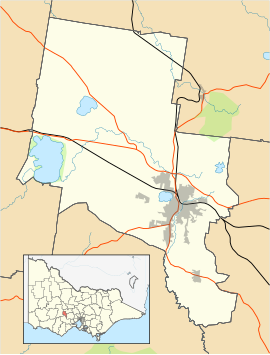Canadian is a residential suburb in Ballarat, Victoria, located 3km south-east of Ballarat Central. At the 2021 census, Canadian had a population of 4,098.[1]
| Canadian Ballarat, Victoria | |||||||||||||||
|---|---|---|---|---|---|---|---|---|---|---|---|---|---|---|---|
 A view over the suburb of Canadian from the Sovereign Hill open air museum's poppet head. | |||||||||||||||
 | |||||||||||||||
| Coordinates | 37°34′34″S 143°52′37″E / 37.576°S 143.877°E | ||||||||||||||
| Population | 4,098 (2021 census)[1] | ||||||||||||||
| • Density | 532/km2 (1,378/sq mi) | ||||||||||||||
| Postcode(s) | 3350 | ||||||||||||||
| Area | 7.7 km2 (3.0 sq mi) | ||||||||||||||
| Location | 4 km (2 mi) SE of Ballarat | ||||||||||||||
| LGA(s) | City of Ballarat | ||||||||||||||
| State electorate(s) | Eureka | ||||||||||||||
| Federal division(s) | Ballarat | ||||||||||||||
| |||||||||||||||
A small gold rush at Canadian Gully occurred in September 1852, during the period known as the Victorian gold rush. The discoveries of three large gold nuggets in January 1853—including the Canadian, then the largest recorded nugget ever—led to another gold rush which lasted for several years. Canadian became its own suburb. A post office opened in 1886 and closed in 1988. Urban settlement had spread to Canadian by the 1980s.
It is primarily a residential area, but has a school, a small shopping area, and several parks and reserves including Canadian Lake and also Sparrow Ground, which has been the subject of much community debate[why?].
Geography edit
Canadian is a residential suburb located approximately 3 kilometres (1.9 mi) south-east of Ballarat Central. The suburb's residential part is located along the Ballarat-Buninyong Road.[2]
History edit
During the first years of the Victorian gold rush, Canadian Gully[a] became one of the most prominent diggings on the Ballarat goldfields. January 1853 marked the discoveries of three gold nuggets each weighing over 1,000 ounces (28 kg) — including the Canadian, then the largest recorded nugget ever — and brought a gold rush to Ballarat greater than the original rush at Golden Point in 1851. The gully and the Canadian deep lead (buried gold-bearing riverbed) below it were extremely rich, and one area known as the "Jewellers' Shop" yielded over a ton of gold. However, the rush ended within several years and the nuggets found there were surpassed both in size and in public memory by later discoveries, such as the Welcome Stranger.[2][3]
The Canadian Gully and Canadian Lead give their name to the existing suburb of Canadian.[2] The gully itself were named after a digger known as Canadian Swift.[2][4] A post office opened on 1 March 1886 and closed in 1988,[5] while a railway station at Canadian was part of the Buninyong railway line, which existed from 1889 to 1947.[2]
Ellsworth Street became the boundary between the City of Ballarat and the now non-existent Shire of Buninyong, putting Canadian in both municipalities. The suburb was historically not well-regarded, because Buninyong Road sometimes became marsh, and there was a lepers' camp nearby in southern Golden Point. By the 1980s, urban settlement had spread to Canadian.[2]
Parks edit
Canadian is also the location of Lake Esmond, which was formerly a quarry for Eureka Tile Works until 1982, and later converted into a lake and recreational area that opened on 6 June 1988. Lake Esmond is often used by various Rotary Clubs, and is maintained by the City of Ballarat, and the Rotary Club of East Ballarat.[6]
Education edit
Historically, the suburb lacked a school and children were sent to the Eureka Street, Golden Point, and Richards Street Primary Schools. In 1997, Canadian Lead Primary School was formed from the amalgamation of these three schools, as well as the school in Millbrook. It is located in the suburb's north, beside Pennyweight Gully Creek.[2] Canadian does not have a high school, and parts of the suburb are either zoned for Woodmans Hill Secondary College or Mount Clear College.[7]
Notes edit
- ^ Canadian Gully was located north of the junction of Elsworth Street and Main Road, within the southern boundary of what is now Sovereign Hill.[3]
References edit
- ^ a b Australian Bureau of Statistics (28 June 2022). "Canadian (State Suburb)". 2021 Census QuickStats. Retrieved 3 November 2022.
- ^ a b c d e f g "Canadian". Victorian Places. Retrieved 27 September 2023.
- ^ a b McCarthy, Peter (October 2022). "The 1853 Canadian Gully nuggets, Ballarat, Victoria" (PDF). Journal of Australasian Mining History. 20: 73–85.
- ^ Stacpoole, Henry James (1971). Gold at Ballarat; the Ballarat East goldfield; its discovery and development. Kilmore, Victoria: Lowden Publishing Co. p. 68. ISBN 0909706115.
- ^ Premier Postal History. "Post Office List". Retrieved 11 April 2008.
- ^ "Lake Esmond - City of Ballarat". Archived from the original on 4 July 2007.
- ^ "Find my School". www.findmyschool.vic.gov.au. Retrieved 27 September 2023.
